Why Has My Cat Started Peeing On The Bed?
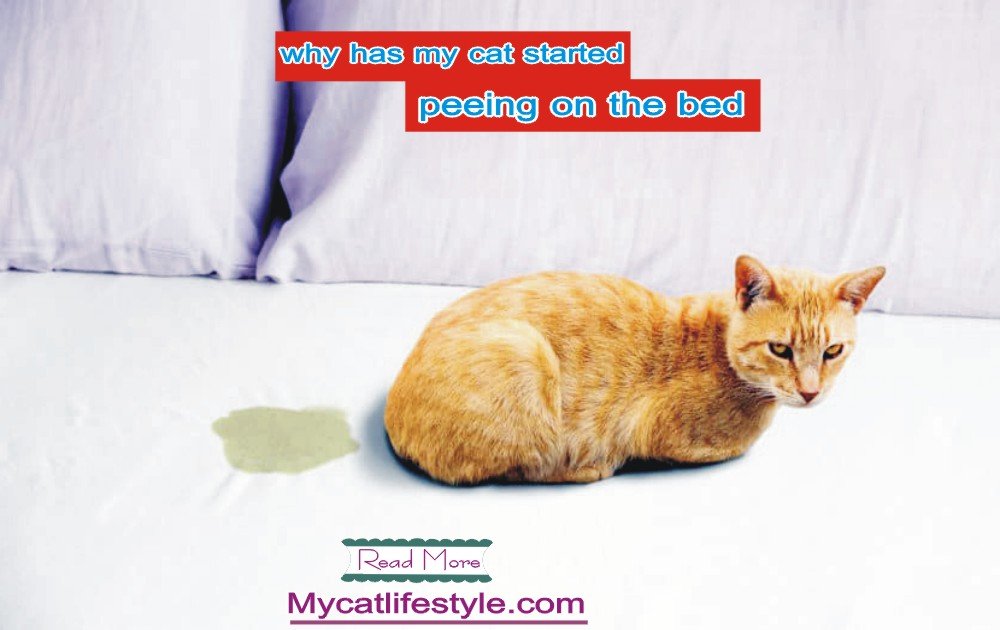
When your cat suddenly starts treating your bed like a litter box, it can leave you feeling frustrated, not to mention a little grossed out. It’s a common issue that many cat owners face, yet it often catches us off guard. The key to navigating this tricky situation lies in understanding the “why” behind the behavior. Cats aren’t spiteful creatures; when they start peeing on the bed, it’s a sign that something’s up. Whether it’s medical, emotional, or environmental, your feline friend is trying to tell you something important.
Unraveling the mystery requires a mix of detective work and empathy. Cats are creatures of habit and comfort, so a deviation like this is a red flag that shouldn’t be ignored. It could be anything from a urinary tract infection to stress, or even dissatisfaction with their litter box situation.
Before you throw in the towel (or throw out the mattress), remember that there’s always a reason for your cat’s change in behavior. Understanding and addressing the underlying cause is crucial to restoring harmony to your home—and your bedtime routine

Why Does My Cat Keep Peeing on My Bed?
When a cat repeatedly chooses your bed as a spot to urinate, it’s a clear signal that something isn’t right in their world. Understanding the underlying reasons can help you address the issue more effectively. Here are several factors to consider:
Medical Reasons
- One of the first things to consider when your cat starts peeing on the bed is whether there are any underlying medical issues at play.
- Cats are excellent at hiding discomfort or pain, so sudden changes in bathroom habits often signal health concerns. Urinary tract infections (UTIs), bladder stones, or even more severe conditions like diabetes or kidney disease can lead to inappropriate urination.
- These conditions can make peeing painful or more frequent, driving your cat to pick spots outside the litter box that feel safer or more comfortable, like your bed.
- It’s crucial to book a vet visit as soon as you notice these changes. A thorough check-up can rule out or confirm any medical problems, and your vet can provide guidance on treatment options to help your cat get back to feeling like its best self.
Stress and Anxiety
- Cats are creatures of comfort and routine. Any disruptions in their environment or daily life can lead to stress and anxiety, which might manifest as peeing on your bed.
- Changes such as moving to a new house, a new family member (pet or human), or even rearrangements in your home can unsettle your cat.
- Your bed represents a safe and secure space, filled with your scent, which can be incredibly comforting to a stressed feline.
- Addressing the root cause of your cat’s anxiety is key. This might involve creating a more stable environment, providing extra comfort and attention, or consulting a vet for anxiety-reducing solutions.
Litter Box Issues
- The state of your cat’s litter box can greatly influence their bathroom habits. If the litter box is too dirty, located in an undesirable location, or there aren’t enough boxes for all your cats, your cat might start avoiding it.
- Cats are fastidious creatures who value cleanliness, so a well-maintained litter box is non-negotiable. Additionally, some cats have preferences for certain types of litter or box styles (covered vs. uncovered).
- Experimenting with different setups can help identify what your cat prefers. Ensure you have one more litter box than the number of cats in your home, keep them clean, and place them in quiet, accessible spots to encourage proper litter box use.
Territorial Marking
- Cats use urine to mark their territory, especially if they feel threatened or need to establish their dominance. This behavior is more common in homes with multiple pets but can also occur if your cat sees or smells animals outside.
- If your cat perceives your bed as a prime location within its territory, peeing there can be a way of claiming it. Ensuring your cat feels secure in its environment is essential.
- Providing plenty of vertical space (like cat trees), hiding spots, and separate resources (food, water, litter boxes) for each cat can help reduce feelings of competition and the need to mark territory.
Age-Related Incontinence
As cats age, they may experience a decline in cognitive function or physical health that leads to incontinence. Senior cats might find it challenging to reach the litter box in time or might not fully realize they need to go until it’s too late. Health issues common in older cats, such as arthritis, can also make accessing the litter box painful or difficult. Adapting your home to accommodate these changes is important. Consider placing litter boxes on every floor of your home or opting for ones with lower sides. Regular vet check-ups can also help manage any medical issues contributing to incontinence.
Each of these factors plays a crucial role in understanding and addressing why your cat might be peeing on the bed. By approaching the situation with patience, empathy, and a bit of investigative work, you can help guide your feline friend back to appropriate litter box habits, ensuring a happy, healthy home for both of you.
Addressing each of these issues requires a tailored approach, focusing on making the litter box the most attractive, comfortable, and convenient option for your cat. By doing so, you can help curb the behavior and ensure your cat feels secure, healthy, and happy.
What Can You Do to Stop Your Cat from Peeing on the Bed?
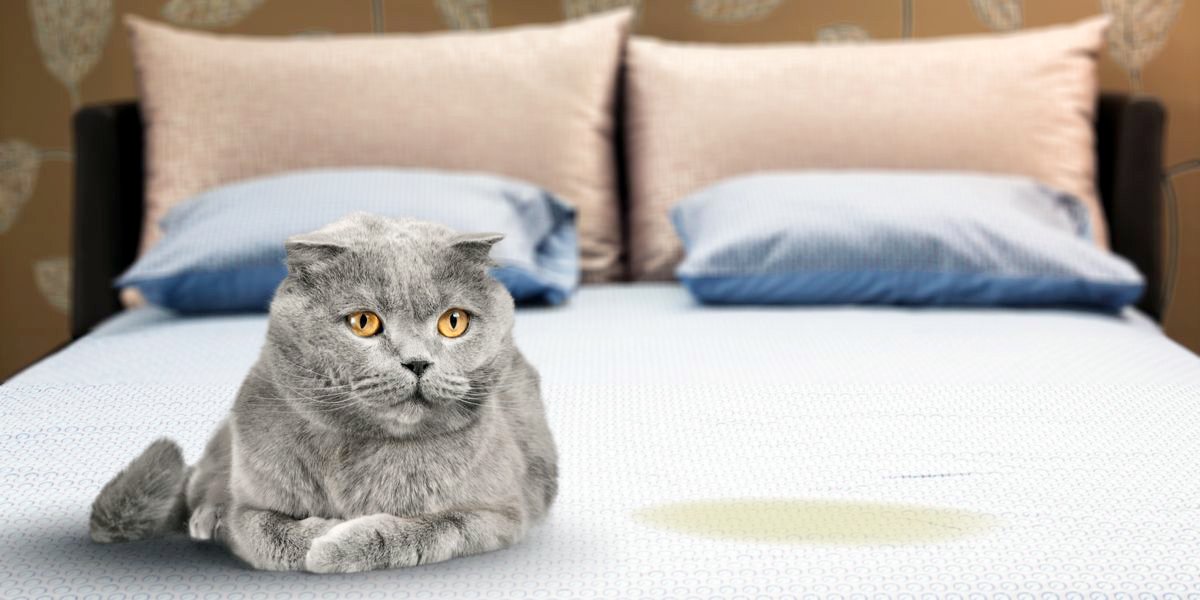
After understanding the possible reasons behind your cat’s new, unwanted bathroom habits, the next step is tackling the issue head-on. Here’s how you can help your cat stop peeing on the bed and encourage them to use their litter box instead.
Visit the Vet
The first port of call should always be your veterinarian. This is crucial to rule out or treat any medical conditions that might be causing the behavior. A clean bill of health means you can focus on behavioral or environmental adjustments.
Litter Box Makeover
Take a good look at your cat’s litter box setup. The box should be cleaned daily, with a full change of litter once a week. If you have multiple cats, ensure there’s at least one litter box per cat, plus one extra. Experiment with different types of litter and boxes (open vs. covered) to find your cat’s preference. Also, consider the location; it should be quiet, easily accessible, and away from their food and water.
Reduce Stress
Identify and minimize stress factors in your cat’s environment. This may involve providing a safe, quiet space for your cat to retreat to, using pheromone diffusers to help calm them, or maintaining a consistent routine. If changes in the household are unavoidable, give your cat extra attention and comfort to help them adjust.
Enhance Territory Security
For cats marking territorially, ensure they have plenty of their own space. Use vertical space like cat trees or shelves and provide multiple hiding spots and resources. For outdoor sightings of other animals, try to block your cat’s view or access to windowsills to reduce stress.
Address Age-related Issues
For older cats, make their environment as comfortable as possible. Place litter boxes with low sides in multiple, easily accessible areas to accommodate any mobility issues. Regular vet visits are essential to manage any age-related health problems.
Behavioral Modification
Sometimes, retraining your cat to use the litter box is necessary. This can involve limiting their access to the bed until the behavior stops or using positive reinforcement to encourage proper litter box use. Never punish your cat for accidents, as this can increase stress and exacerbate the problem.
Protect Your Bed
In the meantime, protect your bed with waterproof covers and remove any bedding immediately after an accident to prevent repeat offenses. Making the bed less appealing by covering it with a plastic sheet when you’re not using it can also help.
With patience, understanding, and a bit of trial and error, you can help your cat return to good litter box habits. Remember, every cat is unique, so finding the right combination of strategies that works for your feline friend might take time.
Read Alos : Why Is My Cat Vomiting At Night?
How to Clean Cat Pee from Your Bed?
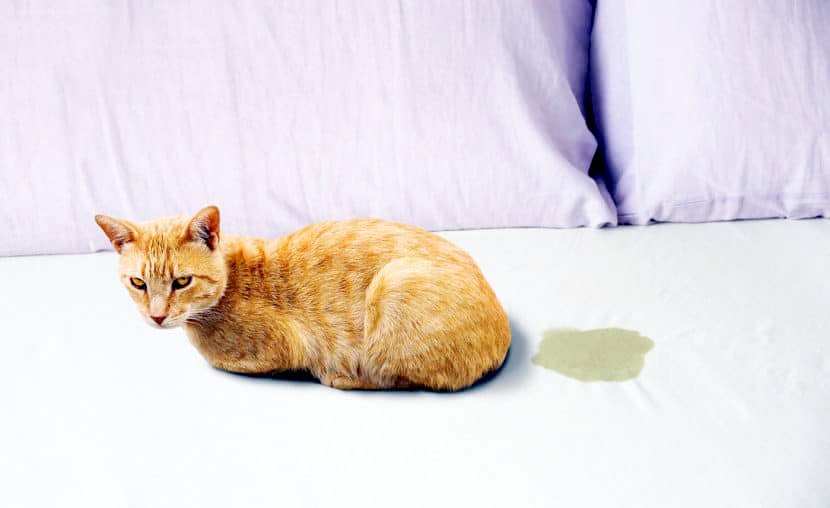
Dealing with cat pee on your bed requires quick and effective action to remove the stain and, more importantly, the odor. Cat urine has a strong, distinct smell that can linger if not thoroughly cleaned. Here’s a step-by-step guide to help you tackle the mess and keep your bed smelling fresh.
Blot the Spot
First, remove any bedding and wash it on a hot cycle with enzymatic laundry detergent, which is designed to break down pet odors and stains. For the mattress, start by blotting up as much urine as possible with paper towels or a clean, dry cloth. Press firmly to absorb the moisture but avoid rubbing, as this can spread the stain.
Use an Enzymatic Cleaner
Apply an enzymatic cleaner specifically formulated for pet stains to the affected area of your mattress. These cleaners break down the urine at a molecular level, neutralizing the odor and stain. Follow the product’s instructions, usually involving leaving it to soak for a specified period.
Air Dry
Let the mattress air dry completely. This can take several hours or even a day. Speed up the process by using fans or placing the mattress in a well-ventilated area or in direct sunlight, if possible.
Check for Odor and Stain
Once dry, check for any lingering odor or stain. If the smell persists, you may need to repeat the cleaning process. For tough stains, consider using a mixture of baking soda and water to create a paste, apply it to the stain, let it dry, then vacuum it up.
Prevent Future Accidents
To prevent future incidents, consider using a waterproof mattress protector. These covers can save you a lot of hassle by protecting your mattress from stains and odors.
Cleaning cat pee from your bed can be a bit of a chore, but with the right approach, it’s definitely manageable. Acting quickly and using the right products will ensure your bed remains a comfortable, inviting place for you, not your cat’s litter box alternative.
What Not to Do If Your Cat Pees on Your Bed
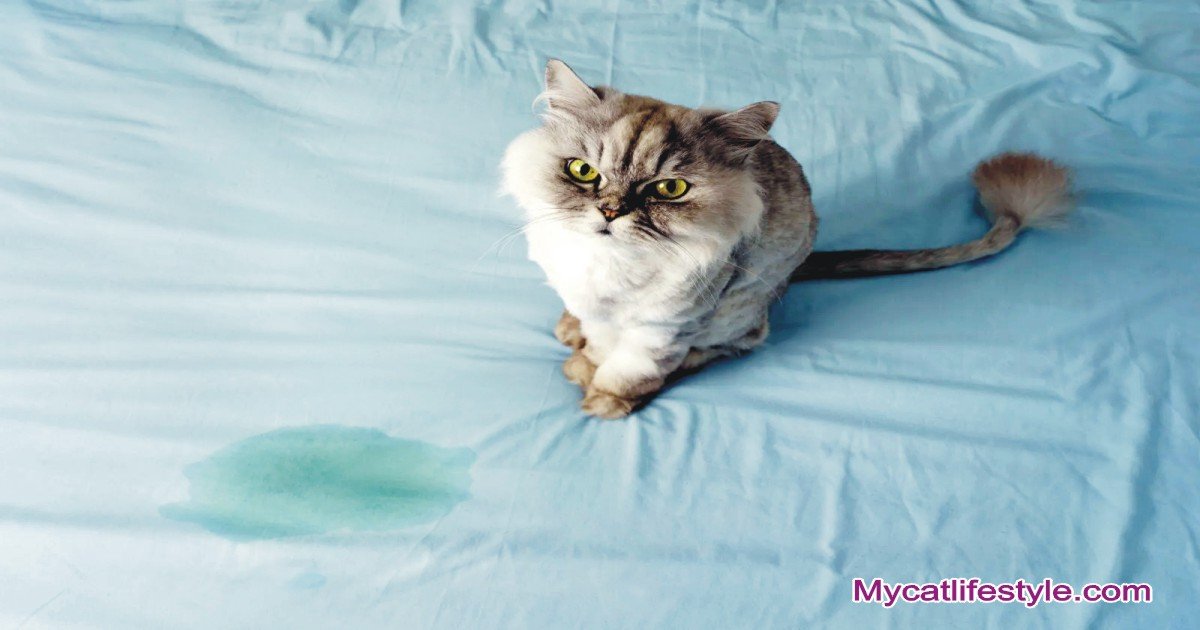
When faced with the challenge of your cat peeing on your bed, it’s just as important to know what not to do as it is to know the correct steps to take. Here are some common mistakes to avoid, ensuring you don’t inadvertently make the situation worse or harm the bond between you and your feline friend.
Don’t Punish Your Cat
It might be your first instinct to scold or punish your cat, but this can lead to more stress and anxiety, potentially exacerbating the problem. Cats don’t associate punishment with the behavior you’re trying to correct. Instead, it might cause them to become fearful of you.
Avoid Ammonia-Based Cleaners
When cleaning up cat pee, steer clear of cleaners that contain ammonia. Cat urine naturally contains ammonia, so using such cleaners can actually attract your cat back to the spot to urinate again.
Don’t Ignore the Problem
Assuming it’s a one-time incident and ignoring the underlying issue can lead to a recurring problem. Whether it’s a health concern, stress, or dissatisfaction with the litter box, it’s crucial to address the root cause to prevent future accidents.
Don’t Delay Cleaning
The longer cat urine sits on your bed, the harder it will be to remove the odor and stain. Prompt cleaning is essential for effective removal and to discourage your cat from marking the same spot again.
Don’t Use Steam Cleaners for Initial Cleaning
While steam cleaners can be effective for cleaning and sanitizing various surfaces, using them on fresh cat urine stains can set the stain and odor more deeply into your mattress.
Don’t Close Off the Bedroom Entirely
While it might be tempting to keep your cat out of the bedroom entirely, this can be disruptive to their routine and increase their stress, especially if they’re used to sleeping with you. Instead, find a balance by protecting your bed with a waterproof cover and addressing the root of the behavior.
Don’t Forget to Consult a Vet
Skipping a vet visit could mean overlooking a potentially serious health issue. If your cat’s behavior changes suddenly, a thorough check-up can rule out or identify medical problems that need treatment.
Understanding what not to do is crucial in handling the situation calmly and effectively, ensuring your cat feels safe and loved while you work together to solve the problem.
How to Get Cat Pee Out of Bedding
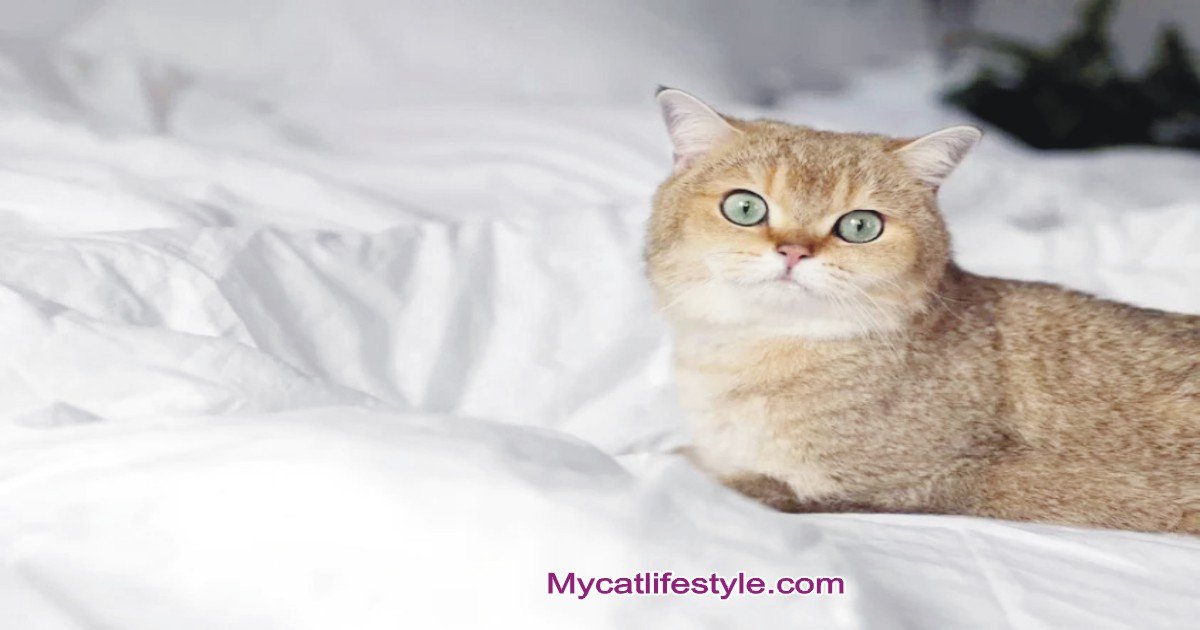
Getting cat pee out of bedding requires prompt action and the right approach to ensure the bedding is clean, odor-free, and comfortable for use again. Here’s a step-by-step guide to effectively removing cat urine from your sheets, blankets, and other bedding materials.
- Remove Bedding Immediately
- Rinse With Cold Water
- Pre-treat With Enzymatic Cleaner
- Wash With Enzymatic Laundry Detergent
- Add Baking Soda
- Air Dry If Possible
- Inspect and Sniff
- Use Preventative Measures
Cleaning cat pee out of bedding can be a hassle, but with the right methods, you can restore your bedding to its pre-accident condition. Remember, patience and prompt action are key to dealing with pet accidents effectively.
How Do You Punish a Cat for Peeing on the Bed?
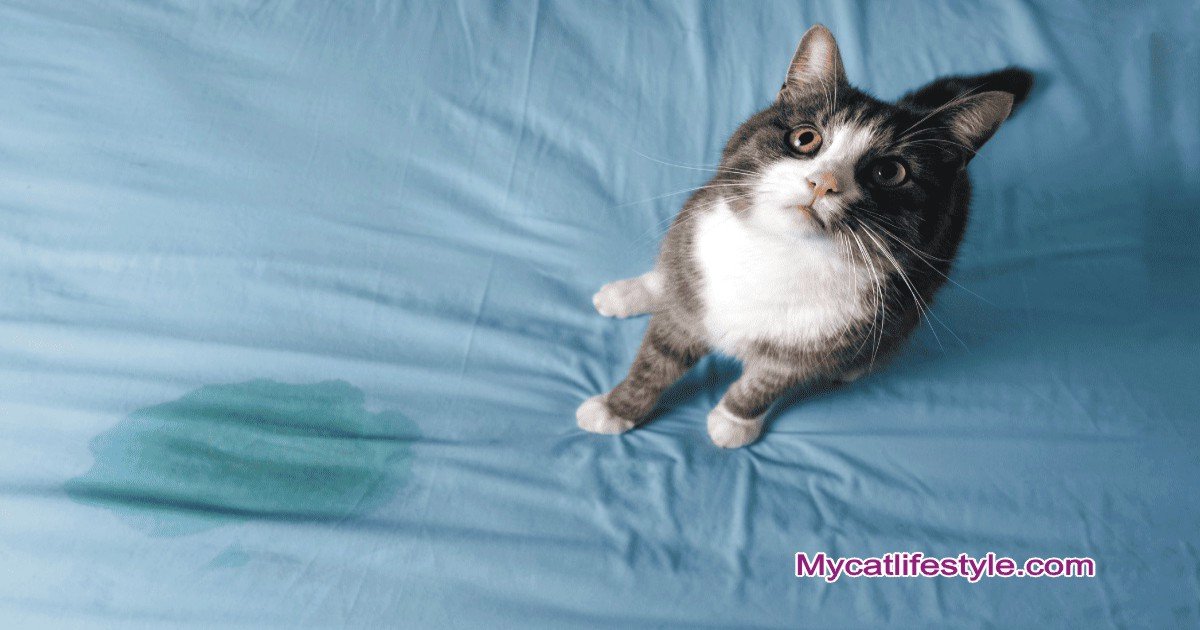
When it comes to addressing unwanted behaviors in cats, such as peeing on the bed, the concept of punishment needs to be approached with caution and understanding. Traditional forms of punishment, like scolding or physical reprimands, are not only ineffective but can also lead to increased stress and anxiety for your cat, potentially exacerbating the problem. Here’s how to constructively deal with the issue without resorting to punishment.
- Positive Reinforcement Over Punishment
- Identify and Address the Root Cause
- Provide Alternatives and Solutions
- Use Deterrents Wisely
- Consult a Professional
- Consistency Is Key
Remember, the goal is to guide your cat back to desirable behaviors through understanding, patience, and positive reinforcement. Punishment can damage the trust and bond between you and your cat, making the problem harder to solve in the long run.
The Best Ways to Deal with the Situation
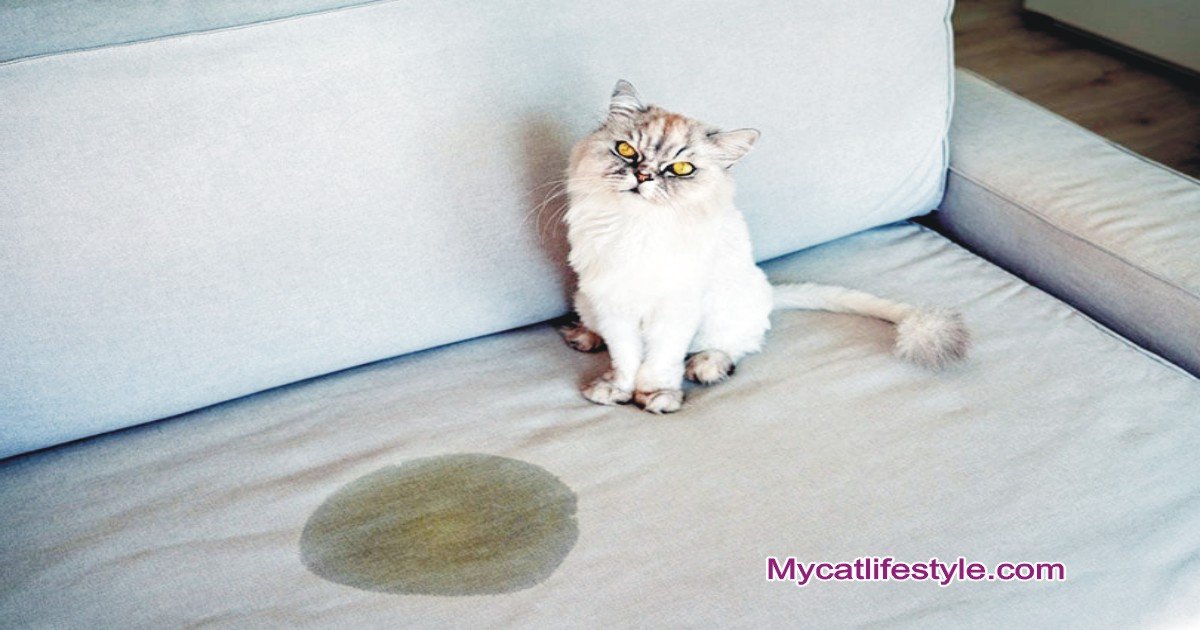
Tackling the issue of your cat peeing on the bed requires a blend of patience, understanding, and strategic action. Here are the best ways to deal with the situation, ensuring a positive outcome for both you and your furry companion.
- Immediate Veterinary Check-up
- Optimize the Litter Box Experience
- Address Stress and Anxiety
- Environmental Enrichment
- Positive Reinforcement
- Clean Affected Areas Thoroughly
- Consider Behavioral Consultation
- Implement Preventative Measures
- Be Patient and Consistent
By approaching the situation with empathy and informed strategies, you can help guide your cat back to good habits and maintain the cleanliness and comfort of your home. Understanding that punishment is not effective and focusing on positive, proactive solutions will lead to the best outcomes for you and your cat.
FAQs:
-
Why does my cat suddenly pee in my bed?
Cats may suddenly pee in your bed due to medical issues (like UTIs or kidney problems), stress, anxiety, dissatisfaction with their litter box, or territorial marking. It’s essential to rule out medical reasons first by visiting a vet.
-
How do you punish a cat for peeing on the bed?
Punishing a cat for peeing on the bed is not effective and can lead to further stress and anxiety. Instead, focus on understanding the cause, improving the litter box experience, and using positive reinforcement.
-
How do I stop my cat from peeing out of revenge?
Cats do not pee out of revenge. This behavior is typically a sign of stress, medical issues, or unhappiness with their environment. Addressing the underlying cause is key to stopping the behavior.
-
Why is my cat peeing on my bed but pooping in the litter box?
This selective elimination can be due to a variety of reasons, including medical issues that make urination painful, stress, or a preference for different textures or locations for urinating versus defecating.
-
Why is my female cat peeing on my bed?
Female cats may pee on your bed due to medical issues, such as UTIs, which are more common in females, stress, or issues with the litter box. A veterinary check-up is essential to rule out health problems.
-
My cat peed on my bed while I was sleeping
This can be particularly distressing. It’s often a sign that your cat is seeking comfort or expressing distress. Consider medical, environmental, and psychological factors.
-
My cat peed on my bed right in front of me
This behavior can indicate a plea for attention or help. Your cat might be stressed, feeling unwell, or unhappy with their litter box situation. It’s a clear sign to evaluate their health and environment.
-
Why has my cat started peeing on the bed all of a sudden?
Sudden changes in behavior like this are often cries for help. Look for underlying medical conditions, stressors in their environment, or dissatisfaction with their litter box setup.
-
Why has my cat started peeing on the bed after moving/changes in the house?
Moves and changes in the household can be stressful for cats, leading them to seek out comfort or express their anxiety in this way. Providing a stable environment and extra comfort can help them adjust.
Conclusion:
Discovering why your cat has started peeing on the bed can be a distressing and frustrating experience. Yet, understanding the underlying reasons behind this behavior is crucial to finding a solution that restores harmony to your home. Whether it’s due to medical issues, stress, environmental changes, or litter box dissatisfaction, it’s clear that peeing on the bed is your cat’s way of communicating that something isn’t right.
Addressing why your cat has started peeing on the bed involves a compassionate approach, focusing on their health, emotional well-being, and the overall environment. From ensuring a clean, appealing litter box to providing a stress-free home, the steps you take can significantly impact your cat’s behavior and well-being. Remember, punishment is not the answer; understanding, patience, and appropriate action are.
As you work towards resolving why your cat has started peeing on the bed, remember that every cat’s situation is unique. It may take time to identify and address the specific reasons affecting your feline friend. However, with consistent effort and a loving approach, you can guide your cat back to their best behavior, ensuring your bed remains a cozy, urine-free zone for both of you.
Ultimately, the journey to resolving your cat’s bed-peeing behavior can strengthen the bond between you and your feline friend. It’s an opportunity to understand and address their needs more deeply, ensuring they feel safe, loved, and well-cared for in their home. With the right approach, you can restore harmony to your living space and enjoy the company of your cat without the worry of unwanted accidents.






